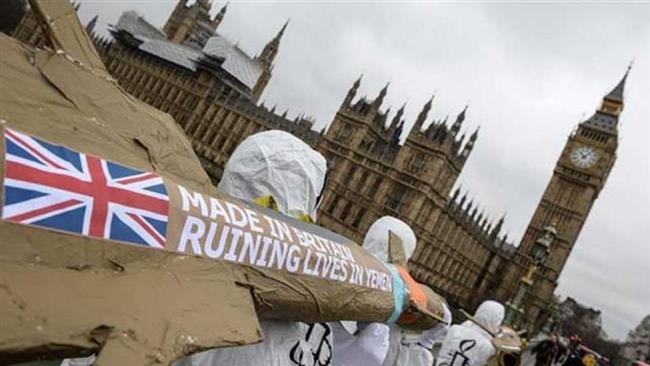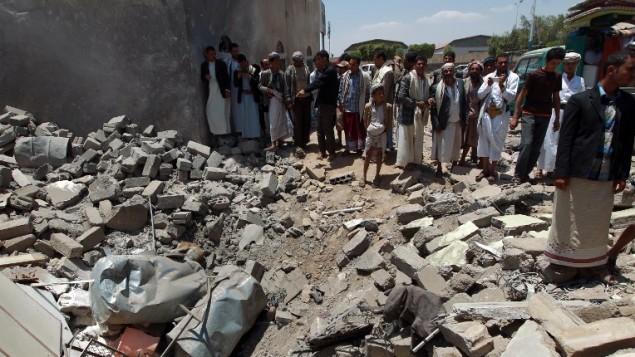
The British High Court recently rejected a legal action challenging the UK’s ongoing export of arms to Saudi Arabia. A very bloody, very profitable business is to continue. The result will deepen the crisis unleashed by the US and UK-backed Saudi war on Yemen.
Saudi Arabia’s campaign against Yemen has proven disastrous for the population, with around ten thousand civilians reported dead from the conflict. Of those casualties, a third are suspected to be children, with the Saudi air force apparently showing little concern when it comes to bombing in and around areas containing schools and other associated civilian targets.
A recent push to end the UK complicity in this conflict was launched last February. The Campaign Against Arms Trade (CAAT) triggered a judicial review in an attempt to get the High Court to review Britain’s export controls under the Consolidated EU and National Arms Export Licensing Criteria. CAAT had based much of their argument around Criteria 2c, which stipulates that the British government cannot grant an export license for weapons in the event of there being a “clear risk that the items might be used in the commission of a serious violation of international humanitarian law.”
“This isn’t an issue that is just going to go away,” said CAAT spokesman, Andrew Smith. “We’re dealing with a situation now where British-made fighter jets are dropping British-made bombs in a conflict instigated by Saudi Arabia, with little regard for international humanitarian law or human rights. This has to stop.”
Did CAAT have a case? The High Court clearly did not think so, eventually rejecting their claim last month and endorsing existing government policy of exporting weapons to Saudi Arabia. For those outside the corridors of power, however, a casual look at the situation regarding British exports to Riyadh, the capital of Saudi Arabia, would indicate that CAAT does indeed have solid cause for concern.
The UN’s own figures point to a mounting crisis in Yemen. According to the then Under-Secretary for Humanitarian Affairs, Stephen O’Brien, as of the beginning of this year some ten million Yemeni people required immediate humanitarian aid to “save or sustain their lives.”
Less than half of Yemen’s hospital and healthcare facilities are reputed to be functioning, with some two million internally displaced people. In addition to a spiralling death toll, over 40,000 are believed to have been injured. This number itself a conservative estimate given the problems involved with collating casualty data during conflict.
The actual death and wounding of Yemeni citizens by military action is just one side to this dire story. As of 2015, UNICEF warned that some three hundred thousand children were facing malnutrition. At the start of this year that figure had expanded to two million. Making matters worse, malnutrition deepens the vulnerability to disease.
Indeed, the speed of the outbreak of cholera in Yemen has been described as “unprecedented” by the World Health Organisation (WHO). As of May, some 23,000 cases of cholera had been reported in under three weeks, with WHO predicting the number could rise to 300,000 in six months. Predictably, those suffering from hunger are proving to be at heightened risk, with a toxic combination of malnutrition, poor living conditions and overwhelmed medical facilities creating an environment where disease proliferates at alarming speed.
What does all of this have to do with the UK? CAAT would say a lot. Much of the chaos afflicting Yemen is a direct result of Saudi air strikes, themselves often deploying hardware and munitions bought from Great Britain. The severity of the conflict does not appear to have moved UK policy makers to reconsider the weapons support, with roughly two hundred and thirty million pounds worth of equipment being exported to Riyadh from late 2016 to March of this year. In addition to armaments, much of this equipment is believed to include targeting equipment for use on military aircraft, as well as small arms and components for aircraft maintenance and operations, all of which, since the start of the conflict three years ago, comes to the princely sum of well over three billion pounds.
“What we’re seeing here is the result of a long-standing relationship between British governments, Conservative or Labour, and Saudi Arabia, one that over the years has seen billions of pounds worth of British weapons end up in the hands of one of the worst human rights abusing regimes on the planet,” argued Smith of CAAT. “Any common sense understanding of the law would mean our arms exports would simply stop, yet that just isn’t happening due to the political and financial interests involved.”

It is not going to come as a surprise to hear that the global arms trade is big business. It is also no secret to hear that the UK is a serious player in such an affair, having increased its total share of the global market to four and a half percent within the past few years. Britain’s arms exports are believed to have increased by twenty six percent between 2011 and 2016, earning the UK the lofty title of being the sixth largest exporter of weapons in the world. What is bizarre is how, on paper at least, the UK is a signatory to myriad treaties prohibiting the export of arms to states known for potentially violating international humanitarian law, particularly those nations known for habitual disregard of established human rights norms.
Saudi Arabia certainly fits the bill here. In addition to its conduct in Yemen, Riyadh made a poor showing of itself when it came to the 2011 Arab Spring, putting down protests by its own citizens with force and even intervening with the same intent in neighboring Bahrain. In this instance Britain yet again had a part to play, with Saudi Arabia deploying troops with the aid of UK-manufactured armored personnel carriers. Whereas it is unclear as to what say Britain had when it came to the actual use of force on Bahraini protesters, it is more than evident that London had a palpable interest in seeing order restored as quickly as possible, particularly in regards to Bahrain’s status as a host for a sizable Royal Navy presence and as yet another customer for British weapons.
It is no major revelation to point out that human rights tend to fall by the wayside when it comes to British economic and political concerns. Yet Britain’s relationship with Saudi Arabia takes such ruthless policies to new heights. In addition to having supported Saudi Arabia for the entirety of its existence, the UK has always acted as a public relations outlet for the nonsensical belief that Riyadh takes human rights seriously, even to the extent of applying pressure to get the Kingdom elected to the UN Human Rights Council in the midst of both attacks on Yemen and the brutalization of its own citizens.
Take the example of Prime Minister Theresa May’s actions last year. Evidently trying to shore up her position at home by adopting a strong stance on foreign policy, May did the rounds in Riyadh last winter with a state visit, in the process seeking to demonstrate that Britain’s relationship with Saudi Arabia was conducive to human rights fulfilment. While people at home scratched their heads at what precisely this meant, May’s true purpose soon became clear, one where close diplomatic ties proved conducive to not only arms sales but UK complacency on Saudi funding to dubious entities elsewhere. Indeed, in this particular instance it led to London refusing to publish findings on Riyadh’s financial relationship with potentially terrorist-orientated organizations.
Which brings us back to the High Court and CAAT’s legal challenge. Much of the court’s deliberations prior to the final verdict are said to have stemmed from the viewing of secret evidence, something that was utterly inaccessible to all parties aside from the UK government’s own legal team and CAAT’s special advocate. Whatever was in the document was apparently enough to convince the presiding judges to deem the government’s export policies to be “rational,” with the rejection of CAAT’s case being the end result. Arms exports will therefore continue.
The war business is a devastating one, particularly for those who do not find themselves in comfortable offices in Washington or London, but entrapped in a conflict that shows little sign of ending.
Daniel Read is a UK-based journalist specializing in human rights and international relations. He originally studied journalism at Kingston University, London, prior to obtaining post-graduate degrees in both global politics and human rights. He blogs at uncommonsense.me and tweets at DanielTRead.
